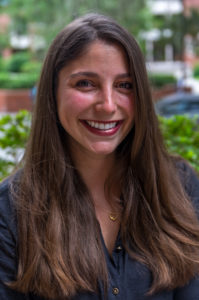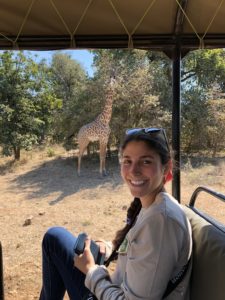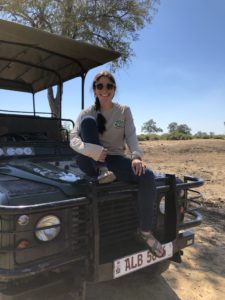
Hannah Herrero, assistant professor of geography and director of the Geographic Information Science and Technology Program at UT
by Alexandra DeMarco
This semester, Hannah Herrero, University of Tennessee assistant professor of geography, is joining the Global Research Office as the inaugural Global Sustainable Development Faculty Fellow. This position was created to bring awareness and education to UT about the UN’s 17 Sustainable Development Goals. Encouraging these goals is a facet of UT’s most recent Strategic Vision, which has been upheld by actions such as badging courses that teach the SDGs and hosting International Education Week with the theme “Embracing the United Nations’ Sustainable Development Goals.”
Herrero has an extensive background in international environmental research. As an undergraduate and graduate student at the University of Florida, Herrero made a dozen trips to Southern Africa, conducting field research on bush encroachment with satellite imagery, repeat photography and remote sensing.
She joined UT in the fall of 2019 and brought with her a course she initially taught at UF as a PhD student, “Geography of Africa.” Flagged for all 17 SDGs, the course covers both the physical and human geography of Africa and delves into human-environment interaction issues often informed by Herrero’s years of field work.
One of her favorite parts of the course is debunking students’ misconceptions about Africa, she says, which she does by having students write down their preconceptions about the continent at the beginning of the course and comparing them with what they’ve learned by the end of the course.

Herrero poses with a giraffe while conducting field research in Africa
“In general, I would say that Americans are very American-centric, and so when I talk about these issues in class, students are always shocked, like, what, this is happening? … I am interested in bringing better education to students about what the developing world looks like and what we as a whole human race need to do to make that progress so that people — and I’m not saying that there’s anything wrong with other ways of life — just so that people have basic human rights, things like water, food, access to education, access to health care,” Herrero said.
After moving to Tennessee, Herrero planned on continuing her field work in Africa but was deterred by pandemic lockdowns. In response, she began a new research project investigating an environmental crisis closer to home: seagrass loss leading to widespread manatee death in Mosquito Lagoon, Florida.
For nearly two years now, Herrero has been using satellite imagery to map seagrass loss, marking one of the first projects of its kind, in that region, where satellite imagery has been used. As Director of Science for the recently-created Lagoon Watermen Alliance, Herrero is working to spread awareness about the crisis, which she says many people, even local residents, are uninformed about.
“Everyone was very focused on the manatee death part — great, charismatic mammals, same thing in Africa with their cousin the elephant, that draws people in — but we need to be talking about the bigger issue, which is the seagrass loss,” Herrero said. “Why they’re dying is (because) they’re starving.”
The main cause of seagrass loss is nutrient loading, which occurs when chemicals from entities such as lawn fertilizers, septic tanks and water processing plants leak into the water. Despite the severity of seagrass loss in Mosquito Lagoon, part of the struggle to inform residents about the problem comes from the local district’s assessment of the problem.
“The district is toting numbers like 40% loss, and I’m like, no, it’s over 90% loss,” Herrero said. “There’s literally nothing left, and so we’ve had to go out and do a lot of field work to verify that.”

Herrero has made around a dozen trips to Southern Africa to conduct field research, as pictured here
Now, Herrero has several ideas about how to use her new role and experience to reach campus community members, including hosting faculty workshops about the SDGs, encouraging faculty to apply more outside-of-the-box courses for SDG badging, hosting seminars on the SDGs and creating some kind of program, either in the form of a certificate or minor, for students who are interested in taking classes badged with the SDGs.
The idea for an academic program around the SDGs came about after a positive campus response to the course badging and actually led to the creation of the Faculty Fellow position, Jamie McGowan, director of the Global Research Office, says.
“Since this is an area that obviously speaks to faculty, we assume it probably speaks to student interest in some of the emerging issues of our world,” McGowan said. “And so what we wanted to do is take the courses that had been badged and come up with some sort of a curricular or academic program that students could pursue and then get a certificate or a minor around the SDGs, and so to do that we realized we both needed faculty input and leadership.”
The GRO selected Herrero specifically for her extensive background in international and environmental research and general enthusiasm around her work.
“I think her energy is fantastic and her knowledge base is great, too,” McGowan said. “She’s been engaged with (the) SDGs on her own. … She’s a scholar who works internationally, so she has a global view of the SDGs, which was also important to us, so I just think there’s an array of things she’s bringing that will really benefit our program.”
In addition to spreading knowledge about the SDGs through on-campus programs, Herrero hopes to work with the Programs Abroad Office to encourage study abroad as part of UT’s exploration around the SDGs — and if that is rendered impossible by the pandemic, she has some creative ideas for how to bring environments from halfway around the world to Tennessee.
“How can we bring (study abroad) here without having to send hundreds of students on a plane? One of the things that I’m looking into is getting (virtual reality) systems for the university,” Herrero said. “I know it’s not the same, but it really is like the full, immersive experience, and so even going on safari for an afternoon or going into a village and seeing how people live, those kinds of things, I think would be really eye opening and different even if they couldn’t physically get there.”
As the Global Sustainable Development Faculty Fellow, Herrero hopes to translate her experience raising awareness about international and environmental issues into lessons for the UT community. This includes joining efforts to increase diversity on campus, which Herrero has worked at through selecting graduate students representative of more diverse populations, including a student from Africa.
“University of Florida was a pretty diverse place,” Herrero said. “I’ve found that there is less diversity at the University of Tennessee, and I know that they’re working really hard to remedy that. … A lot of people in Tennessee have never even interacted with someone from Africa before, so just trying to bring awareness to campus I think was my major, primary motivator.”
For more information about the SDGs and SDG badged courses available at UT, visit https://cge.utk.edu/sdg17/.
CONTACT:
Jason Moody (865-974-5752, jmoody9@utk.edu)